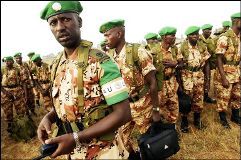African Union Force Seen as Main Hope for Darfur
By Evelyn Leopold
UNITED NATIONS, Aug 27 (Reuters) – Days before a U.N. deadline for Sudan to disarm and prosecute those responsible for violence in the country’s Darfur region, nations are looking to the African Union rather than any U.N. sanctions to curb further killing.
 On July 30, the U.N. Security Council adopted a resolution threatening to consider sanctions against Khartoum if it failed within 30 days to disarm and prosecute Arab militias, known as Janjaweed. They are accused, with the aid of the Sudanese military, of killing tens of thousands of African villagers and forcing them into compounds in a struggle over arable land.
On July 30, the U.N. Security Council adopted a resolution threatening to consider sanctions against Khartoum if it failed within 30 days to disarm and prosecute Arab militias, known as Janjaweed. They are accused, with the aid of the Sudanese military, of killing tens of thousands of African villagers and forcing them into compounds in a struggle over arable land.
The council will get a report early next week and then hear on Thursday from Jan Pronk, U.N. Secretary-General Kofi Annan’s special envoy in Khartoum.
There is no sign the Janjaweed has been disarmed, but diplomats say the United States and European nations, such as Britain, Germany and France, are nearly alone in supporting punitive measures against Khartoum.
U.S. officials, aware of the council’s reluctance, particularly from China and Pakistan, note that the July 30 resolution committed the 15-member body to a continuous review, which meant pressure would not stop next week.
“The Security Council decided to review the Sudan’s progress every 30 days for the foreseeable future,” said Richard Grenell, spokesman for U.S. Ambassador John Danforth.
“If there are certain members of the council who are not able hold Sudan responsible for peace and security in their own country, we will work with others to make sure they do.”
MILITARY INTERVENTION
Any kind of outside military intervention without Sudan’s permission would be bloody. But the African Union is trying to send a peace force and Nigerian President Olusegun Obasanjo has been negotiating on monitors with Khartoum for the past week.
Sudan has not yet agreed to accept the more than 3,000 troops and observers the AU wants to organize. The AU currently has a handful of monitors in Darfur, but a larger force might help disarm African rebel groups fighting the Janjaweed. Rebels have rejected this proposal before a political solution is reached.
Western nations hope that a large presence of African troops or monitors would be a enough to assure villagers they could leave the barren camps and return to their homes. U.N. military experts recommend at least 3,000 troops and 1,100 police.
“It has become increasingly clear that the key to protecting the people of Darfur is an AU mission in sufficient numbers,” Grenell told Reuters.
Few expect any definitive analysis on Darfur from Pronk that would immediately lead to sanctions. An example of what is anticipated came from British Foreign Secretary Jack Straw, who said Sudan was trying to meet U.N. demands to end the 18-month conflict, which has killed up to 50,000 people.
“The government of Sudan have made progress, especially in humanitarian access and camp safety and security within the camps, but people are obviously still very anxious and nervous about whether they will be safe when they go back to their villages,” Straw said after visiting a Darfur camp on Tuesday.
But Human Rights Watch said on Friday its own survey showed the Janjaweed were allowed to maintain at least 16 camps to hold displaced African villagers, and some were partly controlled by Sudanese security forces.
“Throughout the time Khartoum was supposedly reining in the Janjaweed, these camps have been operating in plain sight,” said Peter Takirambudde, executive director of the Africa division of New York-based rights group.
